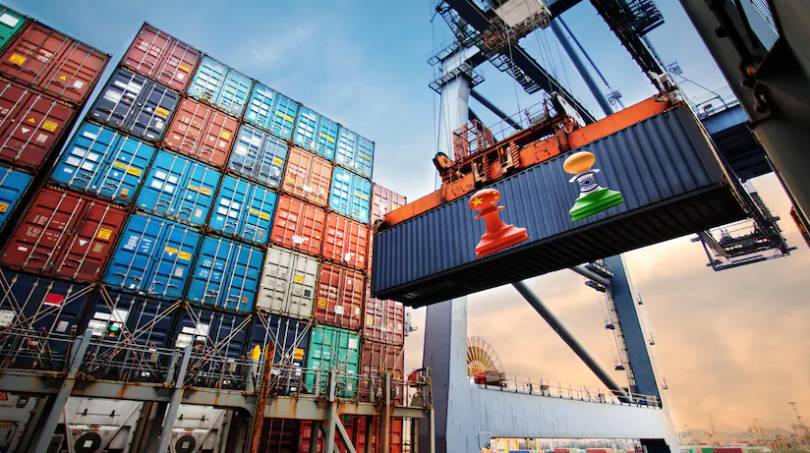How Anti-Dumping Duties on Chinese Black Toner Cartridges Would Harm India
China reported an almost USD one trillion trade surplus at the end of 2024, highlighting its dominance in global trade. Chinese factories now possess advanced technology, uphold the highest quality standards, and maintain the lowest production costs across various industries. This includes black toner cartridges imported under HS Code 84439959, where Chinese manufacturers command the largest market share. The competitive advantage of Chinese factories lies in their vast production capacity, enabling them to meet global demand efficiently. These manufacturers operate with minimal margins but achieve profitability through large volumes, similar to how the U.S. dominated the copier industry in the 1960s, and Japan took over in the 1990s.

Recently, the import of black toner cartridges from China has come under scrutiny due to a petition filed by Indrayani Sales Private Limited. The company is attempting to persuade India’s Directorate General of Trade Remedies (DGTR) to impose anti-dumping duties on completely built black toner cartridges, aiming to boost its own profitability at the cost of millions of Indian users, who would face higher prices as a result.
Why Anti-Dumping Duties on Chinese Black Toner Cartridges Are Unjustified
1. No Evidence of Unfair Pricing (Dumping)
Anti-dumping duties are typically imposed when imported goods are sold below their domestic market price or cost of production. However, in the case of Chinese toner cartridges:
- The key models imported into India are over 10–15 years old, meaning their Bill of Materials (BOM) costs are naturally low.
- High order volumes from Indian importers result in substantial profits for Chinese manufacturers, despite low margins.
- Robotic production lines have significantly reduced labor costs in China.
- Indian importers often request lower specifications, reducing production costs further.
- High-quality, IP-compliant toner cartridges are reserved for markets that respect intellectual property rights and can afford premium prices.
- Chinese factories sell these toner cartridges at identical prices to both domestic and foreign buyers.
- Indian importers represent only 2–5% of Chinese factory output, making it unreasonable to claim that prices are being unfairly set for the Indian market alone.
Further Supporting Evidence:
The Chinese government’s position should encourage a strategic, phased implementation of anti-dumping duties (ADD) — if necessary — by first incentivizing OEMs to establish local manufacturing before targeting compatible toner imports. A more targeted approach would involve applying ADD selectively to encourage OEM toner cartridge production in India, rather than imposing broad-based restrictions that primarily affect small-scale importers.
Economic Impact:
The value of imported compatible toner cartridges is approximately INR 1,500 crores (USD 150 million), which is relatively minor compared to the USD 1 billion worth of OEM toner cartridges imported annually.
2. No Genuine Indian Industry to Protect
The argument that anti-dumping duties would protect local manufacturers is misleading because:
- India lacks a significant domestic industry for manufacturing toner cartridges. The only major local production is bulk black toner powder, which is already subject to anti-dumping duties.
- Existing Indian assembly units primarily assemble imported Chinese components, contributing minimal value addition.
- Indrayani Sales imports all the necessary components from China, highlighting the absence of an independent domestic supply chain.
- Establishing a local manufacturing industry would require significant investment in molds and automation, which is currently unfeasible.
- Indrayani Sales’ production capacity accounts for less than 5–10% of India’s total market demand, employing only a fraction of the workforce compared to the hundreds of Indian importers.
- India’s market requires over 3,000 unique toner cartridge SKUs, and only about 350 models have large volume requirements, making local manufacturing unrealistic.
The Bigger Picture:
A more targeted approach to ADD could help incentivize OEM toner production in India. Before imposing ADD on compatible toner imports, the Indian Government (GOI) should first encourage OEMs to establish local manufacturing. The USD 1 billion import value of OEM toner cartridges presents a more significant economic opportunity than targeting the USD 150 million compatible toner market.
3. Market Distortion and Higher Consumer Prices
- The claim that Chinese imports flood the Indian market and suppress local competition is baseless. India’s market is highly competitive and price-sensitive.
- Indian importers serve millions of customers, ensuring price stability and availability of products across the country.
- If anti-dumping duties are imposed, consumers will be forced to buy OEM toner cartridges, which are significantly more expensive, or settle for subpar locally assembled products.
- This would disrupt the market, reduce consumer choice, and benefit only the petitioner while harming thousands of businesses and millions of end-users.
4. Conflict with International Trade Agreements
- India has already imposed the highest possible basic customs duty on toner cartridges under a new HS Code classification.
- As a signatory to the WTO Information Technology Agreement (ITA) 2000, India allows duty-free imports of printers and their parts under HS Code 84439959. Toner cartridges, being integral printer components, fall under this classification.
- Imposing anti-dumping duties would violate these international commitments and could lead to trade disputes.
5. Unreliable Investigation Process
- DGTR investigations require confidential data from Chinese factories, but many manufacturers are unwilling to share sensitive business information for a market that constitutes only a minor portion of their total sales.
- Many Chinese manufacturers fear that the data could be used arbitrarily to justify ADD imposition as part of a broader political strategy since June 2020.
- Without independent industry experts overseeing the investigation, any findings are likely to be biased, leading to unfair trade restrictions.
Addressing Compliance Costs and Data Concerns:
DGTR can easily verify actual import prices using Indian Customs data, which would reveal that hundreds of Chinese exporters maintain consistent Free on Board (FOB) unit prices within a narrow 10% band. This consistency indicates fair market pricing and profitability. Furthermore, the significant cost difference between compatible toner cartridges (with FOB prices as low as 5% of OEM pricing) is driven by efficiency and competition, not unfair pricing practices. Moreover, India’s pricing structure differs from that of Western markets, where intellectual property (IP) compliance and remanufactured toner preferences create additional cost variations.
A significant deterrent for Chinese manufacturers contesting DGTR investigations is the requirement to disclose 100% of their global pricing data, despite India accounting for less than 2% of their total sales. Given the substantial compliance costs and the perception of DGTR decisions lacking transparency, many exporters opt out of participation. This results in outcomes that favor domestic companies who strategically navigate the system to impose ADD for monopolistic gains, ultimately harming consumer access to affordable toner cartridges.
Indrayani Sales’ Competitive Challenge
The DGTR’s definition of “domestic industry” excludes entities that are heavily reliant on imports. However, Indrayani Sales, the petitioner, claims to represent the majority of Indian production despite its estimated output of only 50,000 cartridges per month—far below the total market demand, which exceeds two million cartridges monthly, broken down as follows:
- OEM: 300,000–400,000 per month
- Imported Compatible Units: 600,000–800,000 per month
- Refilled Cartridges (with parts replaced): 600,000–700,000 per month
- Locally Assembled from CKD Kits: 100,000 per month
- Remanufactured Cartridges: 100,000–150,000 per month
- Simple Refilled Cartridges: 400,000–500,000 per month
Despite claiming independence from importers, a thorough audit of Indrayani Sales’ purchase records could reveal procurement from importers of Chinese products. Notably, their shift away from direct imports aligns with their unsuccessful opposition to previous ADD measures imposed on black toner powder—suggesting a strategic attempt to use ADD as a market control mechanism, rather than as a protection against unfair trade practices.
Conclusion: Anti-Dumping Duties Will Harm, Not Help
The primary goal of anti-dumping duties is to ensure fair competition and protect domestic industries from predatory pricing. However, in this case, there is no legitimate domestic industry to protect. The only beneficiary of such duties would be Indrayani Sales, at the expense of thousands of Indian importers, businesses, and end-users who rely on affordable toner cartridges.

What are your thoughts about Dhruv’s opinion, “How Anti-Dumping Duties on Chinese Black Toner Cartridges Would Harm India.”
Dhruv Mahajan is RT Imaging World’s Regional Partner for India. Based in New Delhi, he has been an international business development manager responsible for the past twelve years developing the aftermarket imaging supplies business throughout the Gulf and Southeast Asia regions.
“I know all the key players in this market and I know they are looking for components as well as finished goods for laser, inkjet, copier, wide-format as well as new printer options. There are many medium-sized businesses I know that are also looking to expand their businesses and I am confident of providing support to them all.”Mahajan is the International Business Development Manager for Ninestar responsible for the Gulf and Southeast Asia regions.
For more information, please contact him at <dhruvm@ggimage.com>
Want to know more about the dynamic market in India? Read Mahajan’s other blogs and articles:
- How Anti-Dumping Duties on Chinese Black Toner Cartridges Would Harm India
- Competition and Government Incentives Drive Growth
- Remanufacturing Printer Consumables in India
- India Will Soon Bounce Back with a Vengeance
- India to be Less Reliant on China for Imaging Supplies
- Anti-dumping Duty Added to Black Toner Imports
- Indian Aftermarket Reacts to Border Clashes with China
- Home Printer Sales Spike Thanks to Homeschooling
- Epson Grabs No 1 Market Position in India
- Indian Students Donate Masks Made from Chinese Printers
- Observing the Third Largest World Market – Trends in India
- Focus on Prices Alone Will Bring Doom
- Making Channel and Distributor Business More Profitable
- NEEDED: A Global Manufacturer to Set Up in India
- Women in the Indian Aftermarket
- Aftermarket Continues to Bite into the OEM Share of India
Comment:
Please leave your comments below for the story “How Anti-Dumping Duties on Chinese Black Toner Cartridges Would Harm India“.





Leave a Comment
Want to join the discussion?Feel free to contribute!